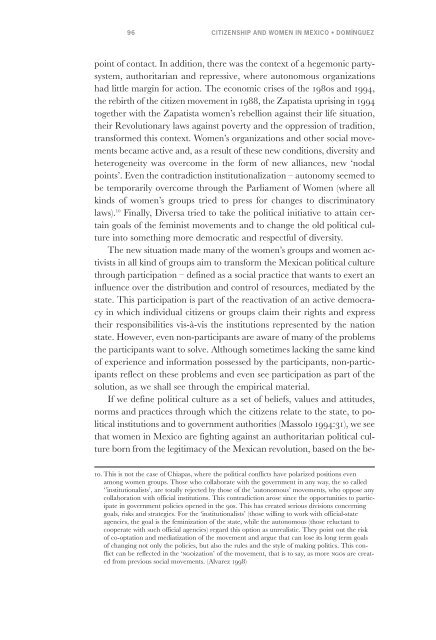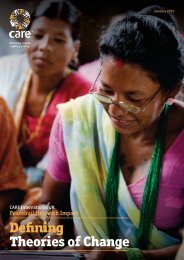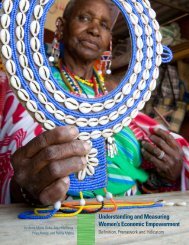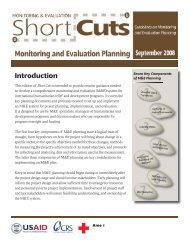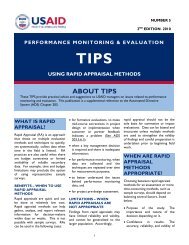Discussing Women's Empowerment - Sida
Discussing Women's Empowerment - Sida
Discussing Women's Empowerment - Sida
Create successful ePaper yourself
Turn your PDF publications into a flip-book with our unique Google optimized e-Paper software.
96<br />
CITIZENSHIP AND WOMEN IN MEXICO • DOMÍNGUEZ<br />
point of contact. In addition, there was the context of a hegemonic partysystem,<br />
authoritarian and repressive, where autonomous organizations<br />
had little margin for action. The economic crises of the 1980s and 1994,<br />
the rebirth of the citizen movement in 1988, the Zapatista uprising in 1994<br />
together with the Zapatista women’s rebellion against their life situation,<br />
their Revolutionary laws against poverty and the oppression of tradition,<br />
transformed this context. Women’s organizations and other social movements<br />
became active and, as a result of these new conditions, diversity and<br />
heterogeneity was overcome in the form of new alliances, new ‘nodal<br />
points’. Even the contradiction institutionalization – autonomy seemed to<br />
be temporarily overcome through the Parliament of Women (where all<br />
kinds of women’s groups tried to press for changes to discriminatory<br />
laws). 10 Finally, Diversa tried to take the political initiative to attain certain<br />
goals of the feminist movements and to change the old political culture<br />
into something more democratic and respectful of diversity.<br />
The new situation made many of the women’s groups and women activists<br />
in all kind of groups aim to transform the Mexican political culture<br />
through participation – defined as a social practice that wants to exert an<br />
influence over the distribution and control of resources, mediated by the<br />
state. This participation is part of the reactivation of an active democracy<br />
in which individual citizens or groups claim their rights and express<br />
their responsibilities vis-à-vis the institutions represented by the nation<br />
state. However, even non-participants are aware of many of the problems<br />
the participants want to solve. Although sometimes lacking the same kind<br />
of experience and information possessed by the participants, non-participants<br />
reflect on these problems and even see participation as part of the<br />
solution, as we shall see through the empirical material.<br />
If we define political culture as a set of beliefs, values and attitudes,<br />
norms and practices through which the citizens relate to the state, to political<br />
institutions and to government authorities (Massolo 1994:31), we see<br />
that women in Mexico are fighting against an authoritarian political culture<br />
born from the legitimacy of the Mexican revolution, based on the be-<br />
10. This is not the case of Chiapas, where the political conflicts have polarized positions even<br />
among women groups. Those who collaborate with the government in any way, the so called<br />
‘’institutionalists’, are totally rejected by those of the ’autonomous’ movements, who oppose any<br />
collaboration with official institutions. This contradiction arose since the opportunities to participate<br />
in government policies opened in the 90s. This has created serious divisions concerning<br />
goals, risks and strategies. For the ‘institutionalists’ (those willing to work with official-state<br />
agencies, the goal is the feminization of the state, while the autonomous (those reluctant to<br />
cooperate with such official agencies) regard this option as unrealistic. They point out the risk<br />
of co-optation and mediatization of the movement and argue that can lose its long term goals<br />
of changing not only the policies, but also the rules and the style of making politics. This conflict<br />
can be reflected in the ‘NGOization’ of the movement, that is to say, as more NGOs are created<br />
from previous social movements. (Alvarez 1998)


